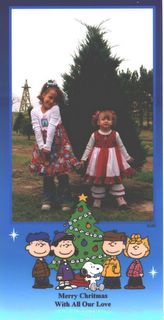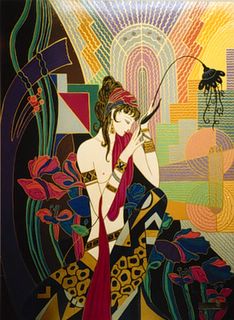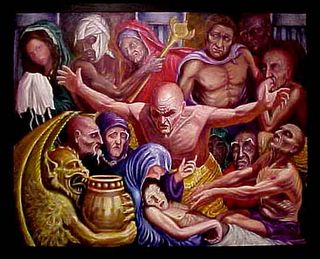(bree-ko-LAZH) noun Something created using a mix of whatever happens to be available. [From French bricolage (do-it-yourself job), from bricoler (to putter around, to do odd jobs), from bricole (trifle), from Italian briccola.]
Dec 27, 2005
Davey's Lamentation
Dec 25, 2005
Christmas Day Triumphant
Connor Plays PSP by Nana

Christmas was spent with Mom and Dad at their house. Unfortunately, they were both sick, so I don't think it was very enjoyable for them. Connor had a wonderful Christmas morning, because his hard work in school paid off for him. He kept his end of the bargain by keeping his grades up, so we came through with his heart's desire, a Sony PSP and some games.
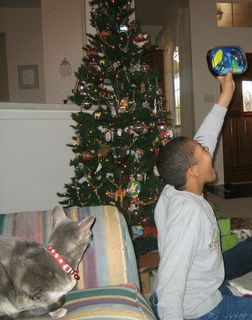
Connor's First Watch by Nana

He also got his first grown up watch, which turned out to be poorly designed, so it actually hurts him to wear it. We will will come up with a suitable replacement as soon as possible. This was the first year he expressed excitement at getting clothing, especially the "cool" clothes he gets from Caryn. He is really growing up.
We got word that Steve asked his wonderful girlfriend, Gina, to marry him. She said yes, so we are going to be aunts-in-law. In spite of illness, Christmas was quite lovely this year. Thank you to Mom, Dad, Marilyn and Connor, I enjoy you all.
Dec 24, 2005
Hitting My Stride
I placed two of my clients this week. They both start their new jobs next week, and it will mark the first time in many years that either of them have held competitive employment. If the momentum continues I will have another two vets working right after the first of the year. I finally feel like I am making progress in my job. Merry Christmas to me and to them!
The Fiend in Human
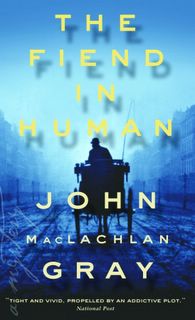
The Fiend in Human

I finished reading The Fiend in Human by John MacLachlan Gray. This Victorian thriller tells the story of a serial killer who preys upon prostitutes and a jaded and self-indulgent newspaper correspondent, Edmund Whitty, who dubs the killer, "Chokee Bill, the fiend in human form." As the story unfolds, more young women are found murdered, and Whitty starts to suspect that the wrong man is in prison facing the gallows for the grisly murders. The correspondent's quest to uncover the truth leads him into the underbelly of London known as The Holy Land, and introduces him to people he would never have deigned to talk to prior to his new experience. The Fiend in Human starts slowly with elaborate descriptions of the sights, sounds and smells of the era, which makes for a fascinating read, but doesn't help move the plot along. As soon as Gray gets the story moving, the plot is riveting and the story turns into a real nail biter. I enjoyed his use of the vernacular of the period. I had to keep a dictionary on hand while reading this novel so I could look up the words I had never heard before, like: costermonger (one who sells vegetables and fruits), peeler (a policeman), ratter (a dog that catches rats, in this case a man who fights dogs and rats), and judy (a prostitute). The vocabulary in this book is so rich and archaic; Gray probably should have included a glossary. I enjoyed The Fiend in Human and recommend that anyone reading the book not let the plodding start put them off the book, the pay off is at the end.
Dec 22, 2005
Christmas Card Extremes
Dec 19, 2005
The Chronicles of Narnia

We saw The Chronicles of Narnia over the weekend and really enjoyed it. All of the kids in the film did a great job. I have to say that I didn't care for any of the characters the children played, except for the youngest girl. The movie was beautifully filmed and the talking animals were incredibly realistic. The only part of the film that bothered me was when the Lion was bound by the Witch for sacrifice. I guess I have become a softy as I've aged, because I was mortified by the sight of it. I think that scene will be too much for a lot of children who want to see the film, it's so intense that it raised my heart rate.
Dec 17, 2005
Annie Oakley of the Wild West
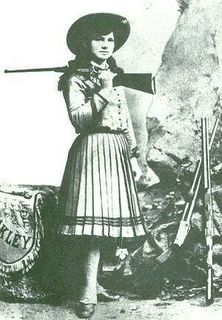
Annie Oakley

I just finished reading Annie Oakley of the Wild West by Walter Havighurst. Havinghurst actually wrote this book in 1954, but it has been re-released several times over since the first edition. My reading taste has leaned toward books about the 1800's for some time now and Annie Oakley of the Wild West tied into so much of what I have been reading through her travels around the world during that period. The book starts out like a novel, telling the story of her childhood that began as Phoebe Ann Mosley on August 13, 1860, in Darke County, Ohio. I was surprised to learn that through a series of unfortunate incidents, she spent some time in an orphanage, and was "lent out" as a servant to a family who she reported both physically and mentally abused her. She was eventually reunited with her mother and a new stepfather and her life improved from that point on. Needless to say, her time in the orphanage colored the rest of her life, and made her particularly sensitive to children in less fortunate circumstances.
Annie helped to support her family by shooting quail, pheasant and other game birds and her prowess was such that she always shot the birds in the head, so that there was no shot to pick out while eating the bird. This might not have made much of an impression on me, but I ate game bird that was shot by a friend's uncle a few years back and it is very difficult to eat when the shot is peppered through the bird. Chomping down on shot is incredibly unpleasant and can break your teeth. Her talent allowed her to sell her birds to the finest restaurants and earned her a good reputation. Her reputation was so good in fact, that upon realizing that she was the "sure shot" that supplied his restaurant; a restaurateur paired her with Frank Butler, a professional target shooter for an exhibition. She won the exhibition, so impressing Mr. Butler that he became her manager and took her on tour. Their chance meeting would lead her into the world of the exhibition shooting, her marriage to Frank Butler, and into international travel touring with the Wild West Show with Buffalo Bill Cody. She transformed herself into Annie Oakley, the world famous markswoman that every American child learns of in elementary school.
Annie’s 46-year marriage to Frank Butler endured world tours with the Wild West Show and life threatening accidents. The couple met and formed relationships with fascinating people along the way including Sitting Bull, Queen Victoria, and countless European heads of state. She participated in Queen Victoria's Golden Jubilee and in the Columbian World Exhibition in 1893 in Chicago. Her life was full of adventure, but she never had children. She had quite a few nieces and nephews and she spent time and money helping orphans around the world. She became a role model for women and taught women how to shoot and she even taught gun safety classes to soldiers during WWI. I enjoyed Havinghurst's book and getting to know more about Annie Oakley, who has become more than just a fascinating historical figure, she's an American icon.
Dec 14, 2005
Light and Dark
I really like this painting and feel it is pretty appropriate since I have been doing a bit of a balancing act between the shadows and light lately. I think the light has won out - as much as it can in my case, and I am going to try to get back to the business of writing again. My new job is more draining than I anticipated it would be, and working with a case load comprised solely of people who are struggling with severe mental illness has left me a little empty at the end of the day. I have always worked with this population on a more limited basis, but now every person I am dealing with is coming from a pretty dark place and that can invade you if you aren't prepared. I don't think I was really prepared, but next week will mark my third month on the job and I think I am finally able to get back into some of my old routines. Blogging will be a nice release of tension, now that my energy level is getting back to normal.
Dec 10, 2005
A Flag and a Purple Heart
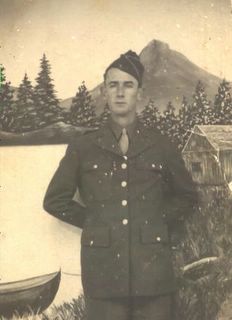
Robert E. Ringleben

My grandmother wrote this poem after her brother was killed in action in WWII. She had it published a couple of times. It has been running through my head a lot lately, so I thought I would share it, and in doing so, relieve myself of the perseveration.
They sent a flag and a Purple Heart--
You were killed in action, they say.
But I can see you more clearly than when
You were only a week away.
You walk at evening along the lane,
Your handsome dark head bare.
When the baby runs to you, laughing,
You swing her in the air.
She rides, high on your shoulder, and twines
Her fingers in your hair.
She isn't a baby, but a big girl now. You'd be
So proud of her.
You stop and kneel beside the boy
When he asks you to string his bow.
Careful and patient, saying, "Son,
I'd better show you how,"
You teach him what you could quickly do:
You wanted him to know.
Ah, he needs you so. You wouldn't know him.
He's grown so tall.
You will never be broken and old,
Bowed with sorrow or pain,
But forever laughing and young,
You walk along the lane.
The children run to meet you, happy
That you are home again.
But they say you were killed in action and sent
A flag and a Purple Heart.
Dec 9, 2005
Harold Pinter's Nobel Lecture

British playwrite, Harold Pinter, accepted the Nobel Peace Prize for Literature this week. Pinter's acceptance speech centered around his scorn for American foreign policy. It begins:
In 1958 I wrote the following:I blanched as I listened to his voice deliver the scathing indictment, because his words were so very damning and so very true. As a playwrite, Pinter vividly illustrates his message with words, heaping a shameful scorn on the American government and by default the American people for allowing the government to run roughshod over the rest of the world in the name of Democracy. We, as freedom-loving Americans, have a lot to answer for. The exposure of the United States' duplicitous human rights policy has diminished our credibility and our stature on the world stage. Continuing to perpetrate the fraud leaves us at the mercy of terrorists and endangers any of our soldiers who are captured. We know better and we simply must do better.
'There are no hard distinctions between what is real and what is unreal, nor between what is true and what is false. A thing is not necessarily either true or false; it can be both true and false.'
I believe that these assertions still make sense and do still apply to the exploration of reality through art. So as a writer I stand by them but as a citizen I cannot. As a citizen I must ask: What is true? What is false?




